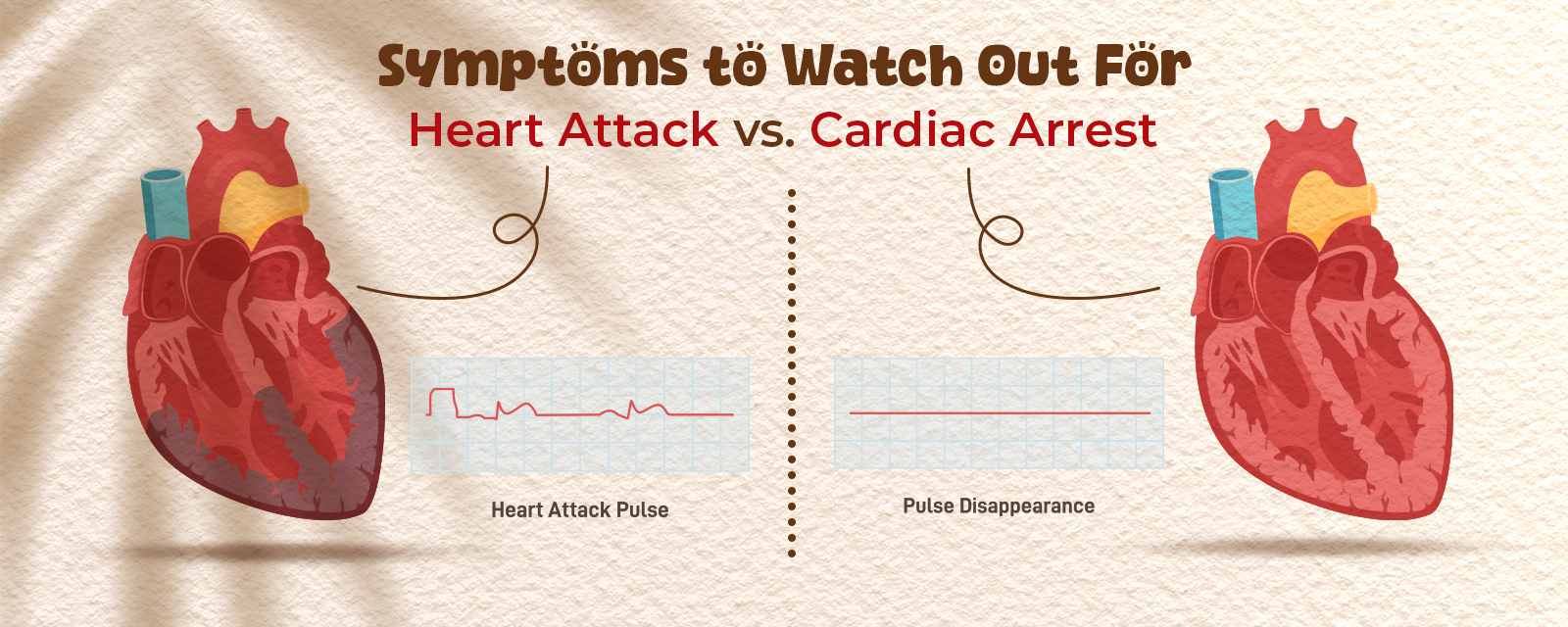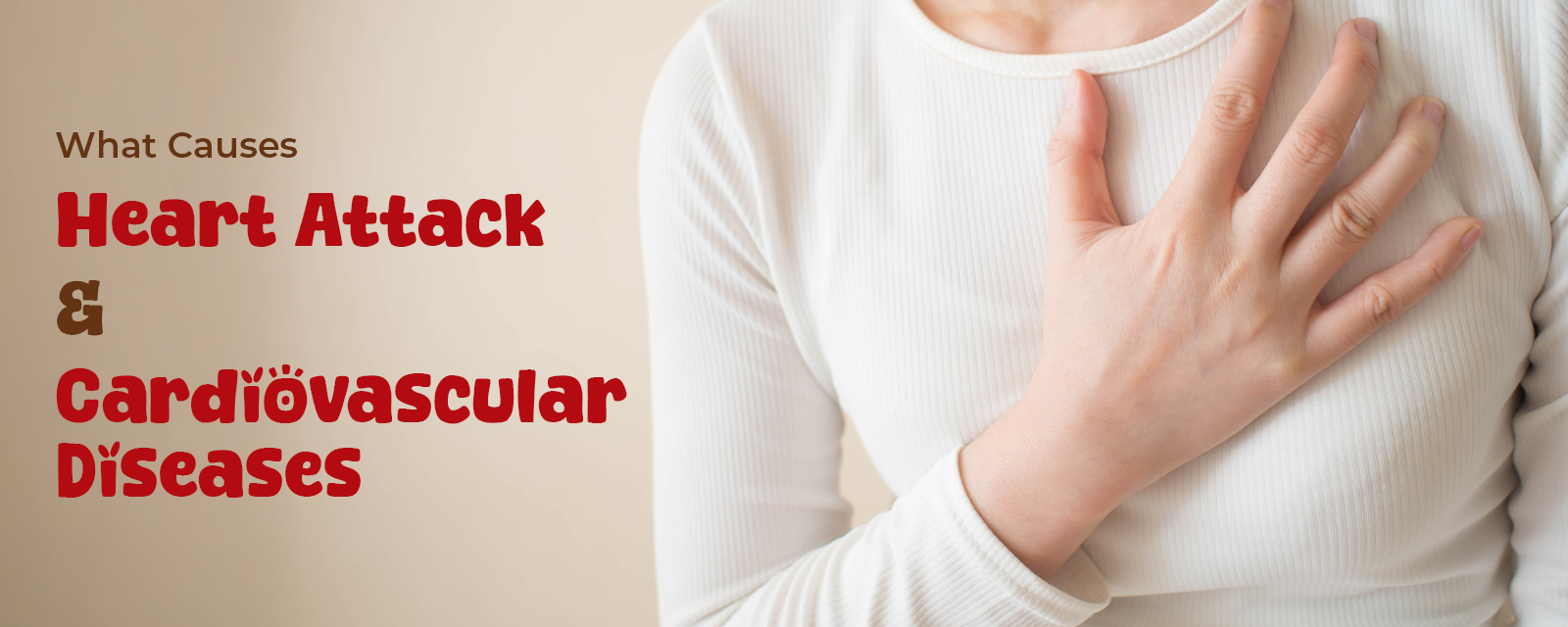The sudden and tragic demise of actress Shefali Jariwala, known for her iconic role in Kaanta Laga, has left everyone in shock.
At just 42, Shefali suffered a massive cardiac arrest and despite being rushed to the hospital by her husband, Parag Tyagi, doctors declared her dead on arrival.
This news has sparked an important conversation about heart health in India.
An estimate suggests that 11% of Indian adults, or roughly 100 million people, suffer from heart disease in India. This is a growing pandemic!
Most people don’t even know the difference between a heart attack and a cardiac arrest, and this misunderstanding can cost lives.
Let’s understand.
What’s the Difference Between a Heart Attack and Cardiac Arrest?
Heart Attack (Myocardial Infarction):
-
A heart attack is a circulation problem and occurs when blood doesn’t flow to one of the arteries in your heart due to blockage.
-
This blockage is usually due to a buildup of fat, cholesterol, or a blood clot in the coronary arteries
-
The heart will keep beating, but a part of the muscle is starved of oxygen. It damages your heart tissue or even kills it if left untreated.
-
The person may remain conscious and experience chest pain, shortness of breath, or nausea.
Cardiac Arrest:
-
Cardiac arrest is an electrical problem that happens when the heart’s electrical system malfunctions, causing an irregular heartbeat (arrhythmia) that causes the heart to stop beating suddenly.
-
When the heart stops, it can no longer pump blood to the body. This makes the person unconscious and causes them to lose their pulse within seconds.
-
Without immediate treatment, the person has almost zero chances of surviving.
Symptoms to Watch Out For: Heart Attack vs. Cardiac Arrest

The symptoms and warning signs of a heart attack and cardiac arrest are different, and this knowledge can save a life. Here’s what you need to know:
Heart Attack Symptoms:
A heart will usually have a subtle or dramatic warning. Watch for:
-
Chest Discomfort or Pain: This is the most common sign and would feel like pressure, fullness, squeezing, or pain in the center or left side of the chest. It may last for more than a few minutes or go away and come back.
- Pain Radiating Elsewhere: The pain you feel in your heart can spread to the arms (often the left), back, neck, jaw, or stomach.
- Shortness of Breath: People may feel this before or along with chest pain.
- Cold Sweat: One of the most obvious signs is cold sweat without any reason.
- Nausea or Vomiting: A feeling os sickness or vomiting.
- Dizziness or Unusual Fatigue: Sudden weakness, dizziness, fainting or feeling extremely tired for no clear reason, especially in women.
Important Note:
The symptoms of a heart attack can be mild or severe, and some people (especially women, older adults, and people with diabetes) may have “silent” heart attacks with minimal or atypical symptoms.
Signs of Cardiac Arrest:
One of the worst things about cardiac arrest is that it is sudden and dramatic, with little or no warning. You can still be aware of:
- Sudden Collapse: A person suddenly loses consciousness and falls.
- No Pulse: There is no detectable heartbeat. This is crucial, and the time is running out.
- No Breathing: The person stops breathing or may gasp for air (agonal breathing).
- Unresponsiveness: The person does not respond to shouting or shaking.
Important Note:
Cardiac arrest, unfortunately, occurs without symptoms. Sometimes, a person may feel chest discomfort, shortness of breath, or palpitations, but usually, it happens abruptly.
Read More: Not Just Alcohol! These 6 habits are Silently Damaging Your Liver!
How to Respond: Heart Attack vs. Cardiac Arrest
For Heart Attack:
- If you or someone around you experience heart symptoms If you or someone else experiences heart symptoms, call emergency services immediately.
- Do not attempt to drive yourself to the hospital. Chew and swallow an aspirin (unless allergic) while waiting for help.
For Cardiac Arrest:
- If someone collapses, is unresponsive, and not breathing or only gasping, call emergency services, start CPR immediately, and use an AED (Automated External Defibrillator) if available.
In case of a cardiac arrest or heart attack emergency in India, dial 112 or 108 immediately for ambulance and medical help - these are toll-free, nationwide emergency numbers that connect you to the nearest available emergency
services. You can also use the 112 India app or press your smartphone's power button three times quickly to activate an SOS alert.
What Causes Heart Attack and Cardiac Arrest?
Understanding what causes heart attacks and cardiac arrest is essential for prevention and quick response. Both are serious heart emergencies.

What causes a Heart Attack?
- Blocked Coronary Arteries: Plaque (fatty deposits, cholesterol) usually builds in your arteries, causing a clot and reducing the blood supply to the heart muscle.
- Unhealthy Lifestyle Factors: High blood pressure, diabetes, smoking, poor dietary habits, obesity, and lack of exercise all increase the risk of plaque buildup and artery blockage.
- Other Contributors: Genetics, chronic stress, and certain infections or even autoimmune conditions can also play a role in causing a heart attack.
What causes Cardiac Arrest?
- Ventricular Fibrillation: A dangerous abnormal heart rhythm, called an Arrhythmia, prevents the heart from pumping blood.
- Electrolyte Imbalances: Low levels of key minerals like potassium or magnesium can disrupt the heart’s electrical system.
- Heart Damage from Previous Heart Attack: Scar tissue or weakened heart muscle increases the risk of electrical disturbances.
- Genetic Conditions: Inherited disorders such as Long QT syndrome can trigger life-threatening arrhythmias.
- Other Triggers: Severe trauma, drug overdose, intense physical or emotional stress, respiratory arrest, or even a strong blow to the chest can cause cardiac arrest.
How to Lower Your Risk of Cardiovascular Diseases:
Heart emergencies can strike anyone, including young, healthy individuals. Here’s how you can protect yourself:
- Get regular heart check-ups, including blood pressure, cholesterol, and consider ECGs if recommended.
- Know your family history. Genetic factors can increase your risk for both conditions.
- Eat Heart-healthy foods, including more greens, nuts, and omega-3-rich foods, and avoid salt, sugar, and red meat.
- Aim for at least 30 minutes of moderate activity more than 4 days a week. Remember to work out according to your capability.
- Avoid Smoking and Excess Alcohol, both are major contributors to heart disease risk.
- Chronic stress can harm your heart over time - find healthy ways to cope.
Important Note:
Even the healthiest people can experience heart emergencies. By understanding the causes and taking proactive steps, you can significantly reduce your risk.
The Bottom Line:
Shefali Jariwala’s untimely passing is not only a heartbreaking loss but also a powerful reminder for all of us.
Never ignore the signals your heart sends you, and understanding the difference between a heart attack and cardiac arrest - and responding swiftly - can truly be the difference between life and death.
Explore more from Naturopedia:
Know why these Heart-Healthy Cooking Oils are a must for your pantry
How Green Tea Can Boost Your Heart Health: The Science Behind It
Heart Health: Agriculture’s Carbon Footprint and Natural Farming


